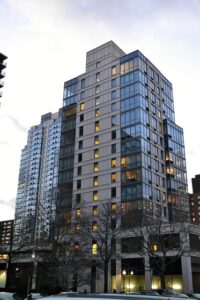 There’s a psychology to reserve fund planning. It’s a mindset I’ve seen take shape within the condo management community throughout the decades and an approach to proactive funding that will pose risks to our built environment that are better addressed now than later.
There’s a psychology to reserve fund planning. It’s a mindset I’ve seen take shape within the condo management community throughout the decades and an approach to proactive funding that will pose risks to our built environment that are better addressed now than later.
But first, some introductions. In 1992, my company, Morrison Financial Services Limited, advanced the first loan to a condominium corporation in Canada. From that point forward, I gained a “boots on the ground” perspective into how reserve fund studies were governed and perceived by the condo boards tasked with saving money for a rainy day. I had a theory back then which has proven true today; that most reserve funds were being chronically underfunded and, as a result, today fall short when needed the most.
I should preface this by saying these are my opinions. I do not have the financial data in front of me to back this claim. What I do have, though, is decades of experience providing financial solutions to condo management teams who find their reserve funds lacking when it comes time to pay for big-ticket repairs and renovations. Those years have left me with insights into why many reserve funds have been underfunded in the past and why the same issue exists today.
A social perception
When I refer to the “psychology” of reserve funding, what I mean is just that; the mindsets and perspectives that have informed reserve fund planning. Consider the fact that, in our culture, condominiums have largely been regarded as a transient mode of homeownership. As I view it, most condo owners love their unit but don’t consider it their final home. Instead, younger owners view condo ownership as a middle step towards owning a single-family house, while older individuals might perceive it as the next stop before a retirement residence, and investors hold on to units until they find the best time to sell. As a result, many owners aren’t too worried about the long-term health of their condo buildings. These same owners get elected to condo boards and determine how much money should go within a reserve fund. And as one might expect, they aren’t in a rush to increase their monthly payments or tighten their purse strings for building repairs or improvements they won’t be around to see.
But what about the Condominium Act?
It’s true the Condominium Act does include provisions for reserve fund planning that are meant to alleviate this issue. It’s also true that the Act has been amended to ensure reserve fund studies are performed regularly to provide guidance on how much money condo corporations need to be saving in order to protect the health and safety of their building and residents.

These guidelines look good on paper but are not complete solutions. I argue that, despite best efforts, reserve fund studies are not an exact science and the amount they suggest doesn’t typically account for all the surprises down the road. I would also make the case that provisions put forth by the Condominium Act to enforce reserve fund planning, while well-intentioned, lack teeth regarding enforcement. At the end of the day, despite all the reports and best practices, reserve fund planning is still governed by a desire to keep condo fees low and avoid upsetting owners.
What does this all mean?
Thirty years and countless loans later, my predictions that reserve funds are chronically underfunded are coming true. But so what?
 Well, one result is that more and more condo corporations will find themselves faced with expensive work that their reserve funds simply cannot handle, triggering the need for a special assessment or a loan, neither of which is an ideal choice (and this, coming from a loan provider). In more extreme situations, I see vital repairs and renovations simply going undone, resulting in severe occupant safety issues and, in extreme cases, the wrecking ball.
Well, one result is that more and more condo corporations will find themselves faced with expensive work that their reserve funds simply cannot handle, triggering the need for a special assessment or a loan, neither of which is an ideal choice (and this, coming from a loan provider). In more extreme situations, I see vital repairs and renovations simply going undone, resulting in severe occupant safety issues and, in extreme cases, the wrecking ball.
As the issue becomes more common, I also see the democratic governance of condominium corporations being removed, at least on this issue. In its place, I predict we’ll see laws come in that give professional condo managers the ability to override this democratic procedure to ensure the right amount of money is going into reserve fund studies, whether residents agree or not.
And yet, I’m optimistic
I do not believe the chronic underfunding of reserve funds is any one person’s fault. It is the result of a psychology passed down from one generation of condo boards and owners to the next, and a mindset that current rules and regulations have not yet addressed to their fullest.
 However, I believe that we can – and want to – do better. Part of me hopes that pride of ownership will prevail; that most condo owners and managers want their assets to be in good repair, even if it means a little extra each month. I also believe everyone in the community has a stake in this issue since the degradation of our urban landscape impacts us all.
However, I believe that we can – and want to – do better. Part of me hopes that pride of ownership will prevail; that most condo owners and managers want their assets to be in good repair, even if it means a little extra each month. I also believe everyone in the community has a stake in this issue since the degradation of our urban landscape impacts us all.
I’ve made a successful business out of lending money to condominium corporations. Over the years, my team has worked with a broad range of condo stakeholders that genuinely care for the health of their building but have found themselves with inadequate reserve fund resources to do what’s necessary. So while it may seem counter to my own bottom line, my advice to them is one I embrace in my business; the best way of operating is one in which everyone plans for the future.
Morrison Financial is a trusted private lender for financing & mortgage solutions in Canada for over 35 years. Visit morrisonfinancial.com for more.







